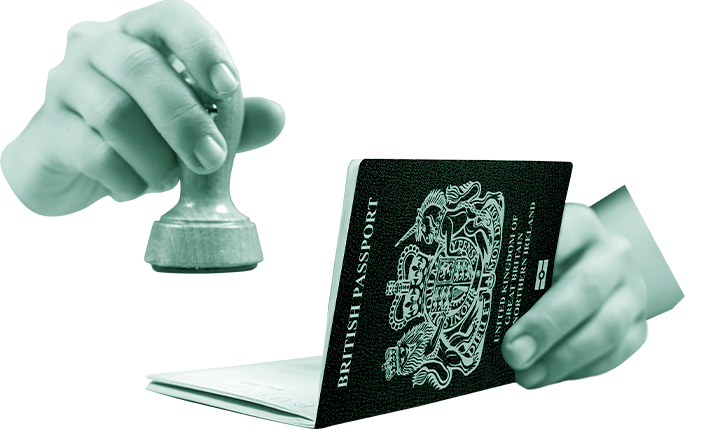Let's Talk

Need Help Urgently?
Call our 24 hour rapid response team now on 0333 311 1090
Request a callback
"*" indicates required fields


The Skilled Worker Visa is a popular route for individuals who have the necessary skills and qualifications to work in the UK. It replaced the Tier 2 visa at the end of 2020 and offers several benefits and improvements over its predecessor. The Skilled Worker Visa allows international workers to work in the UK for licensed employers. To be eligible for this visa, individuals must have a job offer from a UK employer who is on the list of licensed sponsors approved by the Home Office. The job for which they are being employed must be on the list of eligible occupations, and they must meet the skill level requirement of at least equivalent to RQF level 3. One of the significant changes introduced by the Skilled Worker Visa is the lowering of the skill level requirement from RQF level 6 to RQF level 3. This has expanded the number of eligible occupations under this route and opened up opportunities for individuals with diverse skill sets. The Skilled Worker Visa also eliminates the Resident Labour Market Test (RLMT), making it easier and faster for employers to recruit skilled overseas workers. Additionally, there is no cap on the number of Skilled Worker visas available in the UK, providing more flexibility for employers and applicants. Overall, the Skilled Worker Visa offers a streamlined and accessible pathway for skilled individuals to work in the UK and contribute to the country’s economy.
The Skilled Worker Visa is a work visa that enables international workers with the necessary skills to work in the UK for licensed UK employers. It replaced the Tier 2 visa at the end of 2020. The scheme is open to those with skills at RQF Level 3 or above in an eligible occupation. The Skilled Worker Visa is a long-term work visa and will be initially granted for a period of up to five years. It is essential to note that the visa is only valid as long as the visa holder remains in the same role with their sponsoring employer.
To be eligible for the Skilled Worker Visa, individuals must meet several requirements. First, they must have a job offer from a UK employer who is on the list of licensed sponsors approved by the Home Office. The job offer must be for a role on the list of eligible occupations. Additionally, the individual must meet the skill level requirement, which is at least equivalent to RQF level 3.
The Skilled Worker Visa also has specific salary requirements. The individual must be paid a minimum salary of £38,700 per year or the going rate for their job, whichever is higher. They must also meet the English language requirements set by the Common European Framework of Reference. Other requirements include having sufficient funds to support themselves in the UK, passing a background check, and providing necessary supporting documents for the visa application.

The minimum salary requirement for the Skilled Worker Visa is an important aspect of the visa application process. The standard minimum salary is £38,700 per year. This means that the job being offered must provide a salary of at least £38,700 or the going rate for the job, whichever is higher. The going rate for each job is determined by the Home Office and is based on the occupation code. The occupation code is a reference number that identifies the specific job and its requirements. It is important for applicants to check the going rate for their job on the Home Office website to ensure that they meet the salary requirement.
It is worth noting that there are exceptions to the minimum salary requirement. For example, individuals who are new entrants, such as recent graduates or those under the age of 26, may have lower salary requirements. Additionally, certain healthcare or education roles may have different salary rules.
One of the requirements for the Skilled Worker Visa is sponsorship from a licensed UK employer. The employer must have a valid sponsor licence from the Home Office, which allows them to sponsor individuals for the visa. Without sponsorship from a licensed employer, it is not possible to apply for the Skilled Worker Visa. The sponsorship process involves the employer issuing a Certificate of Sponsorship (CoS) to the individual they wish to hire. The CoS contains information about the role, such as the job title, start and end dates, salary, and the employer’s sponsor licence number. It is a crucial document that is required for the Skilled Worker Visa application. The sponsor licence and the CoS demonstrate that the employer has met certain requirements and is eligible to sponsor individuals for the Skilled Worker Visa. They play a significant role in the visa application process and should be obtained before starting the application.
The Certificate of Sponsorship (CoS) is a vital document required for the Skilled Worker Visa application. It is issued by the employer and contains information about the role for which the individual is being sponsored. The CoS includes details such as the job title, occupation code, start and end dates of the employment, salary, and the employer’s sponsor licence number. It serves as evidence that the individual has a valid job offer from a licensed employer and meets the requirements for the Skilled Worker Visa. It is important to ensure that the CoS is valid and accurate before submitting the visa application. The occupation code mentioned in the CoS should match the eligible occupation list provided by the Home Office. Any discrepancies or errors in the CoS can result in delays or rejections of the visa application. Applicants should work closely with their sponsoring employer to ensure that the CoS is obtained and issued correctly, as it is a crucial document in the Skilled Worker Visa application process.

The skill requirement for the Skilled Worker Visa is an important aspect of the eligibility criteria. Individuals applying for the visa must have skills that are at least equivalent to RQF (Regulated Qualifications Framework) level 3 or above.
RQF levels are a way of measuring the difficulty and educational level of qualifications. RQF level 3 is equivalent to A-levels or high school diplomas in the UK. It indicates that the individual has the necessary skills and qualifications to perform the job for which they are being hired.
The occupation code mentioned in the Certificate of Sponsorship (CoS) is used to determine the skill level of the job. Each occupation code is associated with a specific skill level, and individuals must ensure that their skills meet the required level for the job.
The Skilled Worker Visa is open to individuals with skills in a wide range of occupations. The eligible occupations are listed by the Home Office, and applicants should check the list to ensure that their occupation is included.
Proficiency in the English language is a requirement for the Skilled Worker Visa. Applicants must demonstrate that they have sufficient knowledge of the English language, as specified by the Common European Framework of Reference for Languages (CEFR). There are several ways to meet the English language requirement. One option is to pass an approved English language test at a minimum level specified by the CEFR. This includes reading, understanding, speaking, and writing skills.
Another way to meet the requirement is by having a degree or other academic qualification that was taught in English. This exemption applies to individuals who have completed their education in English-speaking countries such as the UK, Canada, Australia, and others. There are also exemptions for individuals from certain countries, including Antigua and Barbuda, Australia, Canada, New Zealand, and the USA. These individuals are not required to meet the English
language requirement when applying for the Skilled Worker Visa.
Applicants for the Skilled Worker Visa must demonstrate that they have sufficient funds to support themselves in the UK. The financial maintenance requirement ensures that individuals can cover their living expenses without relying on public funds. To meet the financial maintenance requirement, applicants must have £1,270 in their bank account. This amount should be available for their first month in the UK. The bank statement serves as evidence of the funds. In some cases, it may be possible for the employer to provide a letter confirming that they will cover the financial requirement for the applicant. This can be helpful if the applicant does not have the required funds in their personal bank account. It is important to note that relying on public funds, such as social welfare benefits, is not allowed under the Skilled Worker Visa. Applicants must show that they have the means to support themselves financially during their stay in the UK.
As part of the Skilled Worker Visa application process, applicants are required to undergo a background check. This is to ensure that individuals entering the UK do not pose a threat to national security or public safety. The background check includes obtaining a criminal record certificate from the applicant’s home country or any country where they have lived for more than 12 months in the past 10 years. This certificate provides information about the individual’s criminal record, if any. The background check is conducted in accordance with the UK’s immigration rules. The rules aim to protect the country and its residents from individuals who may engage in criminal activities or pose a risk to the community. Applicants should be prepared to provide the necessary documentation and information for the background check. It is essential to comply with the requirements to ensure a smooth and successful visa application process.
Healthcare professionals have specific considerations when applying for the Skilled Worker Visa. The visa route recognises the importance of healthcare workers in the UK and offers certain benefits and exemptions.
These provisions aim to attract and retain healthcare professionals in the UK to address the ongoing demand for skilled workers in the healthcare sector. Healthcare professionals considering the Skilled Worker Visa should consult the specific requirements and exemptions applicable to their occupation to ensure a smooth visa application process.

Applying for a Skilled Worker Visa involves several steps and requirements. Here is an overview of the application process:
It is advisable to seek expert advice and guidance from an immigration solicitor to ensure a successful Skilled Worker Visa application.
Supporting documents play a crucial role in the Skilled Worker Visa application process. They provide evidence of your eligibility and support your claims made in the application form. Here are some of the key supporting documents that may be required:
It is important to carefully review the specific document requirements outlined by the Home Office and ensure that you provide all necessary supporting documents to avoid delays or complications in your visa application. These are some of the key supporting documents that may be required for the Skilled Worker Visa application. It is important to consult the Home Office website and seek legal advice to ensure that all necessary documents are provided accurately and in a timely manner.

The Skilled Worker Visa has associated costs that applicants need to consider when applying. Here are the main fees and charges:
Skilled Worker visa processing times can vary depending on various factors, including the complexity of the application and the workload of the Home Office. In general, applicants can expect to receive a decision within three weeks of their application date if submitted outside of the UK. However, applications made within the UK can take up to eight weeks to process. To apply for a Skilled Worker visa, applicants need to complete the online application form and provide all the necessary supporting documents. These documents may include a valid passport, Certificate of Sponsorship reference number, job title and annual salary, occupation code, employer details, proof of English language proficiency, evidence of personal savings, and other relevant documents. It is important to ensure that the application form is filled out accurately and all required documents are included to avoid any delays or complications in the processing of the visa application. The Home Office provides detailed guidance on the application process, which applicants should refer to for specific instructions and requirements.

The Skilled Worker visa is a long-term work visa that is initially granted for a period of up to five years. The exact duration of the visa will depend on the duration of the Certificate of Sponsorship issued by the employer. It is important to note that the visa is only valid as long as the visa holder remains in the same role as the sponsoring employer. However, visa holders have the option to extend their visa before it expires, provided they continue to meet the eligibility criteria. There is no limit to the number of times a Skilled Worker visa can be extended, allowing visa holders to continue working in the UK for an extended period. After a qualifying period of five years on the Skilled Worker visa, visa holders may be eligible to apply for indefinite leave to remain (ILR), which grants them permanent residence in the UK. Once granted ILR, visa holders no longer need to make visa applications and can eventually apply for British
citizenship after one year.
As a Skilled Worker visa holder, it is possible to change jobs or employers within the UK. However, to do so, the visa holder will need to apply for a new Skilled Worker visa. This means that they will need to secure a new job offer from a licensed sponsor and obtain a new Certificate of Sponsorship. Changing jobs or employers as a Skilled Worker involves a few steps. Firstly, the visa holder will need to find a new job with a licensed sponsor. The new employer will need to have a valid sponsor licence issued by the Home Office. Once a job offer is secured, the new employer will issue a new Certificate of Sponsorship to the visa holder. Once the new job offer and Certificate of Sponsorship are obtained, the visa holder can apply for a new Skilled Worker visa. It is important to note that the new visa application must be made before the start date of the new job or within three months of leaving the previous job.
To employ skilled workers under the Skilled Worker visa route, employers in the UK must hold a valid sponsor licence issued by the Home Office. The sponsor licence allows employers to sponsor and employ skilled workers from outside the UK. To obtain a sponsor licence, employers must meet certain requirements and demonstrate a genuine
need for skilled workers. This includes showing that the business is genuine, operating legally, and able to meet its sponsor duties. Employers will also need to provide evidence of suitable HR systems and processes in place for managing sponsored workers. Once a sponsor licence is obtained, employers can issue Certificates of Sponsorship to skilled workers they wish to employ. The Certificate of Sponsorship is a digital document that contains information about the role, salary, and other details of the sponsored worker. It is important for employers to comply with the sponsor duties and responsibilities set out by the Home Office to maintain their sponsor licence and continue employing skilled workers under the Skilled Worker visa route.
If you are already in the UK on a different visa and wish to switch to the Skilled Worker visa, you may be eligible to do so provided you meet the eligibility requirements. This option allows individuals who are already in the UK to transition to the Skilled Worker route without leaving the country. To switch to the Skilled Worker visa, you will need to meet the eligibility criteria, including having a valid job offer from a licensed sponsor, meeting the skill level and minimum salary requirements, and obtaining a Certificate of Sponsorship from your employer. You can apply to switch to the Skilled Worker visa by completing the relevant application form and providing the necessary supporting documents. It is important to ensure that all information provided is accurate and up-to-date to avoid any delays or complications in the application process.
Switching to the Skilled Worker visa allows individuals to continue working in the UK under the Skilled Worker route and potentially qualify for indefinite leave to remain (ILR) and British citizenship in the future.
Under the Skilled Worker visa, it is possible to take on additional work in the UK. However, there are certain restrictions and requirements that visa holders need to be aware of. The additional work must be in the same occupation code and at the same professional level as the main job for which the visa was granted. The additional work must also not exceed 20 hours per week and must not interfere with the visa holder’s main job. It is important to note that visa holders are not allowed to engage in self-employment or work as a professional sportsperson or coach. Any additional work must be within the guidelines set by the Home Office and should not violate the conditions and limitations of the Skilled Worker visa. Voluntary work can be undertaken alongside the main job, as long as it is for a registered charity and does not replace a paid job. However, it is advisable to consult with an immigration lawyer or seek guidance from the Home Office to ensure compliance with the visa regulations.

If you need assistance with your Skilled Worker visa application, it is advisable to seek professional advice from immigration lawyers who specialise in UK immigration law. Applying for a visa can be a complex and time-consuming process, and having expert guidance can greatly increase your chances of a successful application. Immigration lawyers can provide tailored advice and guidance based on your specific circumstances.
They can help you understand the eligibility requirements, assist with the completion of the application form, and ensure that all necessary supporting documents are included.
Additionally, immigration lawyers can help you navigate any potential challenges or complications that may arise during the application process. They can provide expert advice on how to strengthen your application and address any concerns or issues that may arise. By seeking assistance from immigration lawyers, you can have peace of mind knowing that your Skilled Worker visa application is being handled by professionals who have extensive knowledge and experience in UK immigration law.
The Skilled Worker visa is the replacement for the Tier 2 visa in the UK. While they serve a similar purpose of allowing skilled workers to work in the UK, there are some notable differences. One key difference is the skill level requirement. The Skilled Worker visa has lowered the skill level requirement from RQF level 6 to RQF level 3, significantly expanding the number of eligible occupations. Another difference is the removal of the Resident Labour Market Test (RLMT) for skilled worker visas, making it easier and faster for UK employers to recruit skilled overseas workers. Overall, the Skilled Worker visa offers more flexibility and opportunities for skilled workers compared to the previous Tier 2 visa.
A skilled worker is an individual who possesses the necessary skills and qualifications to perform a specific job in the UK. The eligibility is determined based on the occupation code and the demand for that occupation in the UK labour market. To be classified as a skilled worker, you need a job offer from a licensed UK employer in an eligible occupation. The occupation code and the level of skill required for the job will determine if you meet the criteria for a skilled worker visa. It is important to note that the Skilled Worker visa has expanded the range of eligible occupations, making it possible for more individuals to qualify as skilled workers.

Since the end of the Brexit transition period on December 31, 2020, EU nationals are no longer able to work in the UK without a visa. EU nationals who wish to work in the UK now need to apply for a work visa, such as the Skilled Worker visa, under the new immigration system. The EU Settlement Scheme allows EU nationals who were living in the UK before December 31 2020, to secure their status and continue living and working in the UK. However, for those who arrived after this date, a work visa is required to work legally in the UK.
The Skilled Worker visa is a long-term work visa that is initially granted for a period of up to five years, depending on the duration of your Certificate of Sponsorship. However, the visa can be extended multiple times as long as you remain in the same role with your sponsoring employer. After a qualifying period of five years, you may be eligible to apply for Indefinite Leave to Remain (ILR) and eventually British citizenship.
The processing times for a UK skilled worker visa can vary depending on various factors, including the volume of applications and the complexity of individual cases. On average, you can expect to receive a decision within three weeks of your application date if submitted outside the UK. Applications made within the UK can take up to eight weeks to process. It’s important to plan ahead and submit your application well in advance to allow for any potential delays.
If you lose your job while holding a UK Skilled Worker Visa, it is important to take prompt action as you will no longer meet the conditions of your visa. You are required to report any changes in employment or job loss to the Home Office within 10 working days. Depending on your circumstances, you may have options to switch to a different type of visa or apply for a new Skilled Worker visa with a new job offer from a licensed UK employer.

As a skilled worker visa holder, you are allowed to stay outside the UK for a maximum of 180 consecutive days in any 12-month period. Exceeding this limit may have implications for your visa status and eligibility for Indefinite Leave to Remain (ILR). It’s important to plan your absences carefully and ensure you comply with the immigration rules regarding time spent outside the UK.
EU nationals who arrived in the UK before December 31, 2020, can apply to the EU Settlement Scheme to secure their status and continue working in the UK.
However, EU nationals who arrive after this date will need to apply for a work visa, such as the Skilled Worker Visa, to work legally in the UK. The EU Settlement Scheme is not applicable for those who arrived after the end of the Brexit transition period.



Call our 24 hour rapid response team now on 0333 311 1090
"*" indicates required fields
"*" indicates required fields